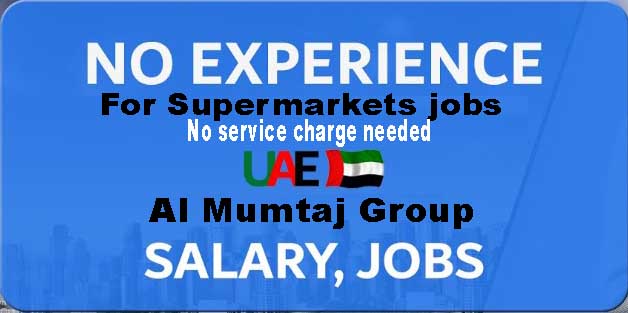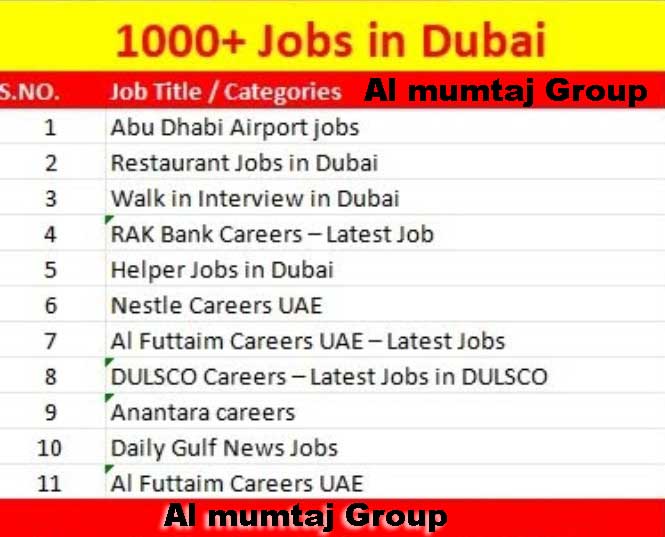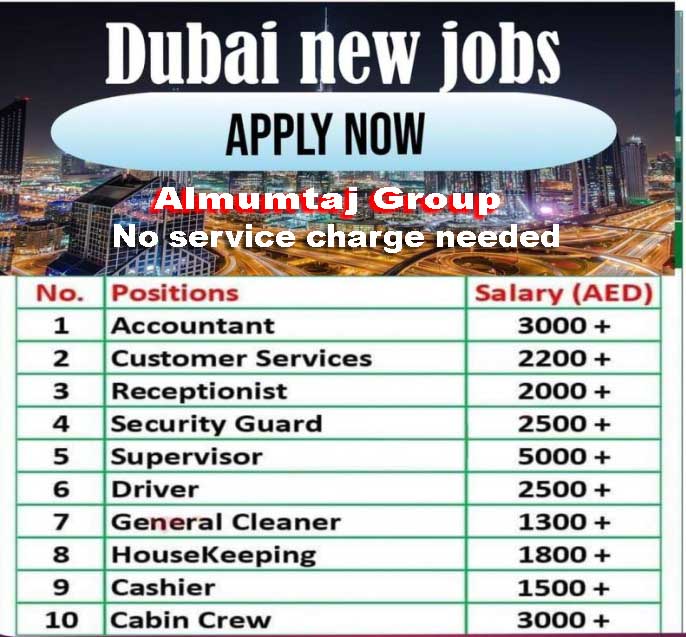We are hiring for our company office
Scroll Down to apply

Dubai Housekeeping Job Prospectures: A Guide to a Rewarding Profession
One of the most sought-after cities for job seekers, Dubai has great chances for anybody wishing to start a career in housekeeping and cleaning services. Skilled and diligent housekeepers are always in demand even if the hotel, residential, and business sectors are exploding. Should you be looking for a housekeeping job in Dubai, this article will provide information about work positions, pay scales, necessary credentials, and pointers on landing one.
Why Would You Want a Dubai Housekeeping Job?
Great Demand for Housekeeping Employees
Luxurious hotels, resorts, commercial centres, and residential buildings needing housekeeping services call Dubai home. Many homes and companies also pay housekeepers to uphold standards of cleanliness and hygiene.
Different Employment Prospectures
Professionals in housekeeping may work in:
Hotels & Resorts
Residential Villas and Apartments
Commercial buildings and shopping malls
Institutions of Hospitality and Healthcare Facilities
Facility Management Services & Cleaning Agents
Beautiful pay and perks
Along with privileges like lodging, food, health insurance, and flight tickets for foreigners, housekeeping jobs in Dubai provide respectable compensation.
Forms of Dubai Housekeeping Employment
Dubai provides many housekeeping jobs depending on expertise and working surroundings. Among the prevalent stances are:
Housekeeper of Hotel Housekeepers
In charge of hotel and resort cleanliness, linen changes, supply replenishment, and maintenance of hygienic standards.
Homekeeper for Residential Houses
cleans, laundry, and other house maintenance while working in private houses or flats.
Office Hysterian
guarantees a neat surroundings by keeping offices, conference rooms, and desks free from clutter.
Personnel in Hospital Housekeeping
works in medical institutions with an eye towards hygiene and keeping a germ-free surroundings.
Commercial and industrial cleaners
manages major cleaning initiatives in public areas, warehouses, retail centres, and airports.
Skills & Qualifications Needed for Housekeeping Jobs
Although most housekeeping occupations do not call for official schooling, several qualifications and abilities might increase employment possibilities.
Instructional Requirements
Although no particular degree is needed, basic education—that which corresponds with a high school diploma—is advised.
One benefits from knowledge of sanitation methods and cleaning chemicals.
Competencies Needed
Ability to maintain cleanliness and meticulous nature.
Time management helps one to finish projects effectively.
Physical ability for extended hours of labour, bending, and lifting.
Particularly for positions in hotel and office cleaning, communication skills are vital.
Experience in Work & Instruction
Though not required, prior knowledge in cleaning or hospitality is desirable.
Many companies provide new hires on-the-job training.
Dubai Housekeeping Job Salary Expectations
Salary for housekeeping in Dubai vary depending on experience, company, and work site. General pay ranges are shown below:
Task Role
AED, the average monthly salary
First-Level Housekeeper
One thousand two thousand
Housekeeper of Hotel Housekeeper
Two thousand to three five hundred
Office Hysterapist
1,500 to 2,500
Housekeeper for Hospitals
Two thousand five hundred – four thousand
Supervisor of Housekeeping
3,500 to 6,000
How to Search Dubai for Housekeeping Jobs?
Online employment portals
Often listing housekeeping job vacancies are websites include Bayt, Indeed UAE, GulfTalent, Dubizzle, and Naukrigulf.
Recruitment Organisations
Many services assist applicants in locating housekeeping employment in businesses, hotels, and residences. Among the greatest agencies in Dubai are some of:
JAMS HR Alternatives
TASCoutsourcing
Guard Group Transguard
Hotel and Facility Management Enterprises
Many five-star hotels in Dubai, including Jumeirah Hotels, Atlantis, and Burj Al Arab, often employ cleaning crew.
Walk-in Enquiries
For housekeeping, many hotels and cleaning businesses use walk-in interviews. Monitoring classified advertisements and social media job announcements can help you remain current.
Advice on Securing a Dubai Cleaning Contract
Get ready with a basic yet strong resume.
On your résumé, highlight your work ethic, talents, and cleaning background.
Get Health Clearance and a Work Visa.
Working lawfully in Dubai requires Emirates ID, a valid work visa, and a medical fitness exam.
Let flexible working hours be your friend.
Many times, housekeeping jobs call for shifts, weekend work, and long hours.
Work on your communication and English.
Many companies would rather have applicants who can follow English directions and grasp ideas.
Difficulties of Being a Dubai Housekeeper
Although housekeeping employment in Dubai provide numerous advantages, they may also present difficulties:
Long hours and physically taxing work
Long hours in housekeeping call for standing, bending, and lifting.
Excellent Performance Guidelines
High standards of cleanliness for hotels and businesses everyday have to be satisfied.
Dubai: Cost of Living
While pay are tax-free, lodging and food costs might be somewhat expensive. Search for work with housing and food perks.
Dubai’s Housekeeping Jobs: Future Prospect
The growing tourist, real estate, and hospitality industries of Dubai guarantee a consistent need for housekeepers. New technologies like smart housekeeping solutions and robotic cleaning could improve job productivity but also force employees to change with the times in cleaning techniques.
Conclusion
For those looking for consistent work, tax-free pay, and professional development, a cleaning job in Dubai presents a great prospect. The need for qualified housekeepers is still strong given ongoing employment vacancies in homes, workplaces, and hotels.
Start working now and seize the many employment possibilities Dubai’s cleaning experts have in waiting!
Hospitality Jobs in Dubai: An expanding industry with rich prospects
Dubai, the global metropolis known for its sophistication, grandeur, and contemporary architecture, has become a preferred vacation destination for both businesses and leisure guests. The hotel sector is vital for Dubai’s economy as it enables the city to be among the top travel and tourism destinations globally. As such, there is a huge need for competent professionals in many various hotel professions, which offers a spectrum of rewarding opportunities for those hoping to start or grow their careers in this fascinating sector. This article will cover the growing hotel job market in Dubai, the benefits of working in this sector, and the sorts of roles with exceptional earning potential and professional growth.
Why would one like to work in Dubai in hospitality?
One of the most fast-growing and most competitive industries in the region is Dubai’s hospitality one. The city’s global tourism hub status—millions of tourists visit its luxury resorts, high-end eateries, and cultural sites yearly—has fuelled demand for hotel professionals. Whether your interests are in food and beverage services, event planning, guest relations, or hotel management, Dubai offers lots of opportunities for you to grow in the hotel industry.
The main elements behind the enormous attraction of hotel employment in Dubai are the following:
High Payrolls and Income Tax-free
Among the strongest reasons for one to work in the hotel sector in Dubai is the financial advantage of getting a tax-free salary. Hotel managers could keep a considerable percentage of their income as the UAE does not impose personal income tax on earnings. Expatriates particularly find this appealing as they may have more free money than in other world marketplaces where income taxes could be more important.
Salary Range: The hotel salary in Dubai will be much influenced by the position, experience, and firm. normally earning AED 3,000 to AED 8,000 a month, entry-level jobs like restaurant servers or hotel staff members normally pay For mid-level jobs—including hotel managers, chefs, and event planners—monthly salary varies from AED 10,000 to AED 20,000. Senior management positions include general managers and executive chefs, along with housing allowances, transport and incentives, may pay upwards of AED 30,000 monthly.
Prospects for Personal Growth in Profession
The hotel sector in Dubai has excellent chances for professional growth. A robust travel and events calendar shows that hotels, resorts, restaurants, and entertainment venues always need trained staff. Always looking for seasoned professionals, Dubai has some of the most exclusive hotel chains and resorts globally, including Atlantis The Palm, Armani Hotel Dubai, and Burj Al Arab.
As the government invests heavily in the development of new attractions, hotels, and events, Dubai’s tourism business is expanding. For individuals working in the hotel business, this development creates a lot of job opportunities. Rising events like the Dubai Expo 2020 (delayed to 2021-2022 because to the pandemic) and other significant projects might push the requirement of talents in the hotel industry even more.
Working in Dubai allows professionals in hospitality to be familiar with some of the most well-known companies in the globe. Many companies provide professional development programs and internal training courses, which might support both local and global hotel markets moving forward.
Work Environment With Diversity
Dubai’s cultural diversity is well-known, and the hotel business most certainly reflects this. Professionals from all across the world build a dynamic and fascinating workplace by working together in hotels, restaurants, and resorts; so, in such environment, This international surroundings enhances the complete working experience and provides possibilities to build global professional networks, which might be rather beneficial in the development of your career.
Working in such a diverse environment helps professionals develop in cultural sensitivity and understanding of international hospitality trends. This is a great way to become well-known worldwide and cultivate a highly sought-after skill set wherever.
Good Work-Life Balance
Some management of hotels in Dubai emphasise a healthy work-life balance. Although the hotel industry is well-known for its demanding schedule and long hours, Dubai’s hotels and resorts sometimes provide staff members tempting incentives that enhance their overall way of life. This includes paid holidays, flexible scheduling, and other perks such gym memberships and health campaigns.
Many times, Dubai hotels and resorts allow their staff reside there, which might assist to save a lot of money. Most hotels also provide food and transportation allowances, which help to balance living expenses.
Various Hospitality Jobs: Dubai: Types
Dubai’s diverse and sizable hotel sector offers opportunities for many various types of employment. From front-line jobs directly engaging with guests to behind-the-scenes administrative and operational tasks, there is something for everyone. Let’s closerly review some of the most sought-after hospitality jobs in Dubai:
Operations and Hotel Administration
Hotel management is among the most sought-after career paths in the Dubai hotel industry. Professionals in this field handle general operating and maintenance for hotels, resorts, or other accommodation facilities.
Front office manager, hotel manager, operations manager, guest services manager.
Salary: Depending on the size and location of the company, hotel managers get AED 12,000 to AED 30,000 per month.
Industry Food and Beverage (F&B)
Dubai’s reputation for offering first-rate eating options allows the food and beverage industry to be thriving. Chefs, restaurant managers, waiters and barman demand is constant in Dubai’s luxury hotels, fine dining restaurants and unofficial bars.
Executive Chef; Sous Chef; Restaurant Manager; Waitstaff; Barman.
Senior chefs often earn AED 25,000; chefs and restaurant managers typically make between AED 8,000 and AED 20,000 a month.
Event planning and management of preparation
Dubai organises many international events, conferences, exhibitions, and weddings; consequently, event management is a highly prosperous line of work. Event planners are highly sought after to manage company events, conferences, product debuts, and large weddings.
Roles include conference coordinator, event planner, wedding coordinator, event manager.
Usually making between AED 10,000 and AED 20,000 a month, elite event planners earn AED 25,000 to AED 40,000 monthly.
Front Desk Operations: Guest Services
For those that like customer service and passion to help others, working in guest services or front desk operations might be a rewarding career. This covers handling guest check-ins, providing information, answering queries, and ensuring first-rate lodging for guests.
Bellboy, concierge, guest relations officer, receptionist.
Guest relations staff can earn AED 4,000 to AED 8,000 a month depending on experience and kind of hotel or resort.
Management of Wellness and Spa Facilities
Dubai has several of the most luxurious spas and wellness centres available worldwide. Professionals in this industry provide a wide range of services from massage therapy and cosmetic treatments to fitness training and wellness coaching.
Roles: massage therapist, beauty expert, gym trainer, spa manager.
Spa professionals often earn AED 5,000 to AED 15,000 depending on the role and the institution.
Working in Dubai’s hospitality industry: advantages
Apart from excellent salary and prospects for professional growth, working in the hotel sector in Dubai has many further benefits:
Among other firms, Dubai has some of the most well-known overseas hotel chains, restaurants, and resorts. Working with these global companies provides useful information that may raise your career prospects.
Dubai attracts hotel experts from all across the world, thereby allowing staff members to get knowledge from some of the best in the company.
Dubai has year-round international events and exhibitions, so there are numerous opportunities to network with influential business executives and strengthen your professional links.
Basically, the path of hospitality jobs in Dubai is shifting.
Among the most rewarding professions one may discover, the hotel industry in Dubai offers competitive income, professional growth, and a wonderful quality of living. Whether your interests are in hotel management, food and beverage operations, or event planning, Dubai offers the ideal environment to launch a successful career in hospitality.
With its growing economy, lively tourist scene, and first-rate infrastructure, Dubai is still a top option for hotel professionals. The enormous demand for working in this energetic metropolis is seen in the high CPC and RPM for material on the hotel job market for Dubai. Hotel employment in Dubai provide a terrific opportunity for both personal and professional growth for those with the required credentials and a passion of giving first-rate service.
Study and work in Germany
Thanks to its world-class education system, research and innovation concentration, and variety of academic programs, studying abroad in Germany is a common option for foreign students.
These salient features of studying in Germany emphasise the advantages: Germany has some outstanding top institutions known for their academic quality and performance.
outcomes of study.
Degrees conferred by German institutions are highly valued throughout.
Many German public institutions provide free education to overseas students, which appeals to individuals seeking a top-notch education free from the weight of tuition costs.
Still, there can be a little administrative cost connected with registration.
Germany has a broad range of undergraduate and graduate level academic programs.
The nation is particularly well-known for stressing engineering, science, technology, and areas connected to research.
Research prospects: Germany leads the globe in invention and research.
Modern amenities and the chance to participate in innovative research initiatives are available to students.
The nation’s numerous Nobel laureates and contributions to many spheres of science mirror its dedication to research.
Programs offered in English: Many German institutions have courses in English, which would be easily available to overseas students without speaking German.
This improves the worldwide learning process and helps a varied student body.
Germany has a robust economy and hosts a lot of global businesses, thereby creating plenty of employment.
Particularly in STEM (science, technology, engineering, and mathematics) sectors, international students frequently find various job possibilities both during and after their education.
Germany has a rich cultural legacy with museums, ancient cities, and celebrations thanks to which
Job prospects for students: International students in Germany are permitted to work part-time during their studies, so augmenting their finances and providing them with practical experience. This allows students to fully engage in German culture and travel Europe.
There are post-study job prospects after graduation that let students remain and work in Germany.
Germany has a solid social safety net, effective public transit, and good quality of living.
Cities with rich cultural scenes and varied populations include Berlin, Munich, and Hamburg.
Though many courses are taught in English, studying in Germany offers a fantastic chance to pick up German.
Speaking German well helps one have better job possibilities and increase their cultural experience.
All things considered, studying in Germany presents a mix of excellent instruction, chances for research, cultural immersion, and maybe professional advantages.
For anyone looking for a well-rounded educational experience, the nation appeals because of its dedication to academic quality and cordial attitude towards overseas students.
Work in Dubai
Because of Dubai’s strong economy, wide range of job possibilities, and good quality of life, many individuals find working in the city to be appealing.
Here are some salient features of Dubai that you should give thought when trying to work there: Various employment possibilities abound in Dubai: banking, real estate, tourism, technology, information technology, and healthcare among other sectors.
Foreigners commonly find chances in industries like hotels, aviation, and construction.
Dubai draws a varied worldwide talent pool, therefore fostering a cosmopolitan working atmosphere.
Dubai hosts several foreign businesses that give chances for experts with various backgrounds.
Working in Dubai has one of the appealing features: there is no personal income tax.
Employees may so usually make more than in many other nations out of their pay.
Salaries in Dubai are often very competitive, and as part of their offer to perform their employment foreigners sometimes get extra advantages such housing allowance, health insurance, and travel allowance.
contemporary Infrastructure: Dubai has a developed commercial sector along with contemporary infrastructure.
The city has contemporary amenities, a reliable transit system, and a vibrant commercial sector.
Dubai is well-known for its ethnic variety, and inhabitants of many countries call the city home.
This cosmopolitan surroundings may provide special and exciting social and occupational opportunities.
Usually, people need a work visa sponsored by their company to be employed in Dubai.
Different specific criteria and procedures mean that research and adherence to Dubai government rules is much more important.
With so many events, seminars, and business meetings, Dubai presents numerous chances for networking.
Building professional ties and advancing a career depend on networking at some extent.
Although Dubai boasts a great quality of life, one should take everyday costs, housing, education, and cost of living into account.
To help to offset these expenses, some companies could provide housing subsidies or other perks.
Cultural and legal issues: You should get acquainted with Dubai’s local laws, traditions, and cultural standards.
A good job experience depends on one respecting local customs and abiding by rules.
Research the particular criteria of your sector, grasp the visa application procedure, and investigate employment prospects via online job portals, recruitment firms, or direct application to local businesses before seeking a job in Dubai.
Examining official Dubai government websites and channels may also provide useful knowledge on legal criteria and employment licenses.
Work in Poland
Thanks to Poland’s economic development, varied employment possibilities, and rich cultural diversity, many individuals find working in the nation to be appealing.
These salient features should help you decide whether or not to work in Poland: Poland is a desirable place for job seekers as it has seen consistent economic development recently.
The nation has a vibrant service industry, a sophisticated industrial sector, and a strong emphasis on invention and technology.
Diverse Job Opportunities: Poland offers a wide range of areas including IT, finance, manufacturing, and services from where employment possibilities abound.
Particularly in sectors such information technology, engineering, and healthcare, the need for competent experts is expanding.
Poland belongs to the European Union (EU), which offers third nations and EU residents various advantages.
While non-EU people would have to seek for a work visa, 4,444 EU residents have the ability to work in Poland without one.
Poland has a rich cultural legacy with ancient cities, gorgeous scenery, and a thriving arts sector.
Working in Poland gives the chance to fully experience Polish culture and tour the historical places and customs of the nation.
Language Considerations: Although many multinational companies run in English, particularly in bigger cities, knowledge of Polish might be advantageous for certain roles and enhance the whole quality of living and working in that nation.
Generally speaking, living expenses in Poland are less than in many Western European nations.
This covers everyday needs, travel, and lodging as well as utilities.
Nonetheless, the city and way of life might affect the expenses.
Work-life balance: Poland is renowned for its method of approaching this.
Many Polish firms stress a good work-life balance, giving staff members paid vacation and suitable working hours.
Poland has well-known research centres and universities.
If you want to keep on your study, you might look at Polish prospects in higher education.
Usually, non-EU nationals need a work permit to be employed in Poland.
This procedure entails getting a job offer from a Polish company, which will thereafter assist you with application for a work visa.
4,444 EU members are entitled to work without a permission.
Poland values networking, hence job searchers may investigate employment prospects via professional networks, job fairs, and internet platforms.
Researching the employment market and knowing the particular needs in your industry is crucial.
Check the most recent work permit rules and legal criteria before seeking for a job in Poland.
Investigating employment prospects via professional networks, recruitment companies, and internet job boards will also enable you to get in touch with Polish possible employers.




